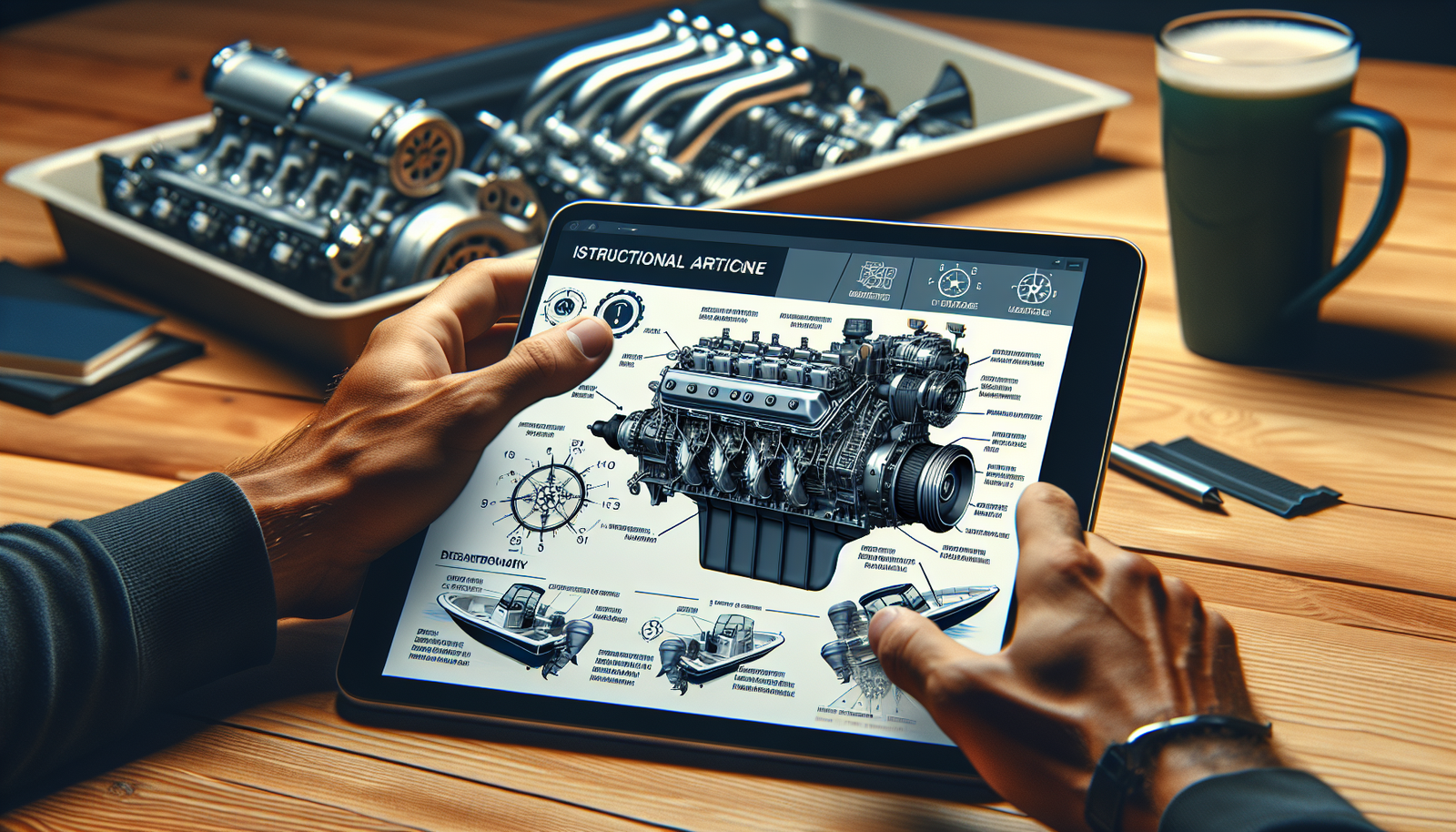You may be a novice boater, an experienced sailor or someone just curious about the mechanics of a boat engine; whatever the case may be, “FAQs About Boat Engines Answered” is the article that can provide the answers you need. In this enlightening piece, all those head-scratching complexities and lesser-known facts about boat engines are brought to light. Despite their intricacies, having a clear understanding of boat engines does not have to be as challenging as navigating through stormy seas. Brace yourself, as this well-rounded guide sails you through the common questions about boat engines, and helps you to demystify these marine marvels.
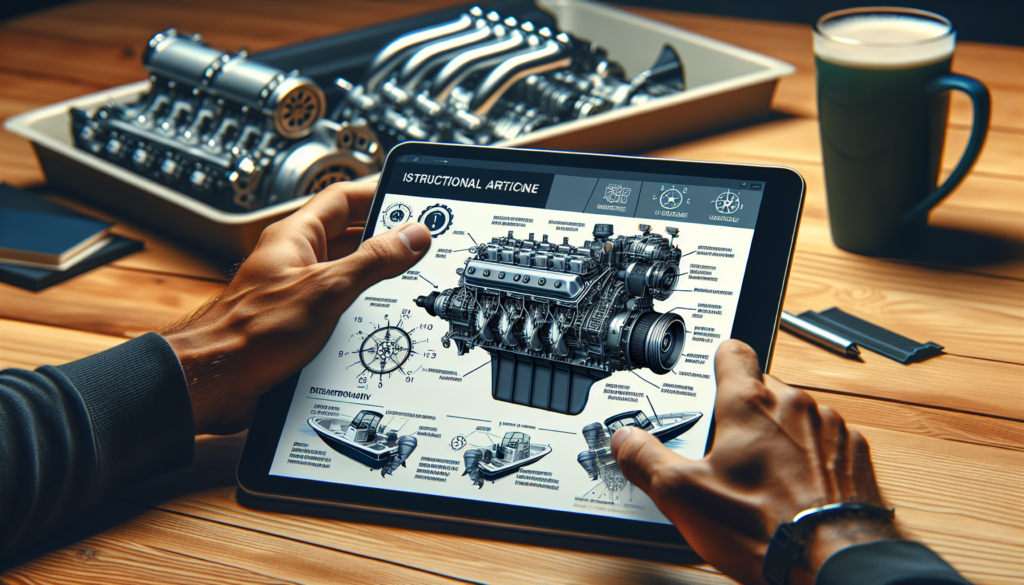
Different Types of Boat Engines
A boat engine serves as the heart of the vessel, providing the necessary power to navigate through open waters. There are different types of boat engines, each with their unique strengths and weaknesses. It’s essential to understand these differences before making your investment.
Inboard Engines
Inboard engines are typically situated inside the hull of your boat, hence the name ‘inboard.’ They are ideal for larger vessels since they offer a high level of power and balance. Furthermore, inboard engines offer improved maneuverability, making them a popular choice for water skiing and wakeboarding.
Outboard Engines
As the name suggests, outboard engines are located on the exterior of the boat, typically at the stern. They are highly versatile, providing both propulsion and steering. Their easy access makes maintenance relatively easier, and they’re typically lighter and less expensive than inboard motors.
Sterndrive Engines
Combining elements of both inboard and outboard engines, sterndrives, also known as inboard/outboards (I/O), are situated inside the boat, similar to inboard engines. However, unlike inboard engines, they drive a propeller situated outside the boat, much like an outboard engine. They offer a lot of power and are ideal for larger boats that need agility at slower speeds.
Jet Engines
Jet engines operate by sucking water into a pump internally and expelling it back out at high speed, which propels the boat forward. They don’t have any external moving parts, making them safer for swimmers and marine life. Jet engines are fun, fast, and maneuverable.
Choosing The Right Boat Engine
Choosing the right engine for your boat is crucial. It’s a decision that significantly impacts how you use your vessel, its performance, and its maintenance needs.
Considering the Boat Type
You should consider your boat type before selecting an engine. Larger boats tend to gravitate towards inboard or sterndrive engines due to their compact size and integrated design. Meanwhile, smaller boats generally use outboard engines due to their lightweight and space-saving capabilities, as well as easy maintenance.
Understanding Horsepower
Understanding an engine’s horsepower is key to ensuring your boat operates efficiently and safely. In general, a more powerful engine will allow you to reach higher speeds and carry heavier loads. However, excessive power can make a boat difficult to control and lead to higher fuel consumption.
Considering Engine Efficiency
Engine efficiency should be another defining factor in your decision-making process. Fuel-efficient engines may have a higher upfront cost but could save you money in the long term with reduced operating expenses.
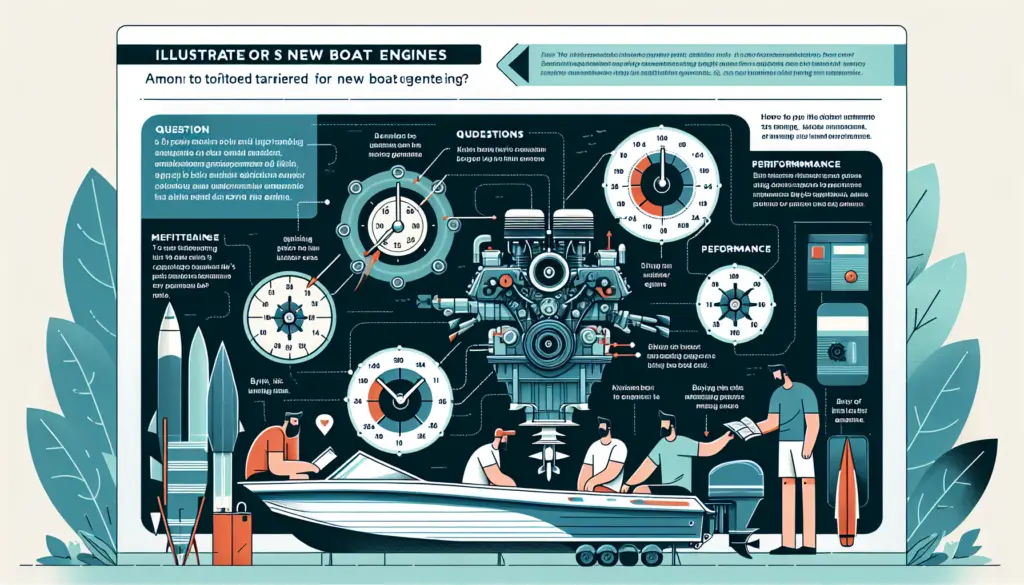
Maintaining Your Boat Engine
Proper maintenance is essential for all boat engines, regardless of type. Ensuring the engine is clean, well-lubricated, and free of damage can help prolong its lifespan and improve efficiency.
Regular Inspections
Regular inspections help identify and rectify potential issues before they escalate into more significant problems. Your inspection should cover all aspects of your engine, including fluid levels, belts, hoses, and connections.
Cleaning and Flushing
Regular cleaning and flushing of your engine can help to prevent the build-up of sediment, scale, or corrosives that can hinder performance. This is particularly important for those who boat in saltwater, as the salinity can dramatically increase the rate of corrosion.
Battery Maintenance
Maintaining your boat’s battery is crucial. This includes cleaning terminals, checking electrolyte levels, and ensuring the battery is fully charged before setting sail.
Fueling Essentials
Using fresh, quality fuel is important. It’s also a good idea to use a fuel stabilizer if your boat is going to be out of use for a while. This can prevent fuel degradation and the growth of fuel-related bacteria and fungi, which can gum up the works.
Understanding the Life Expectancy of Boat Engines
Life expectancy for a boat engine can vary significantly depending on several factors.
Factors Affecting Engine Lifespan
How you use and maintain your engine primarily affects how long it will last. Environmental factors like humidity and saltwater corrosion can also shorten an engine’s lifespan, as can long periods of inactivity.
Increasing Engine Lifespan
Regular maintenance can increase the lifespan of your engine significantly. Furthermore, using your boat regularly keeps the engine lubricated and helps prevent standstill corrosion.
Average Lifespan of Different Engine Types
The average lifespan of different boat engines can vary greatly. Typically, an outboard engine can last 1500-2000 hours with proper maintenance, while inboard engines can work well for over 3000 hours or more than 15 years.
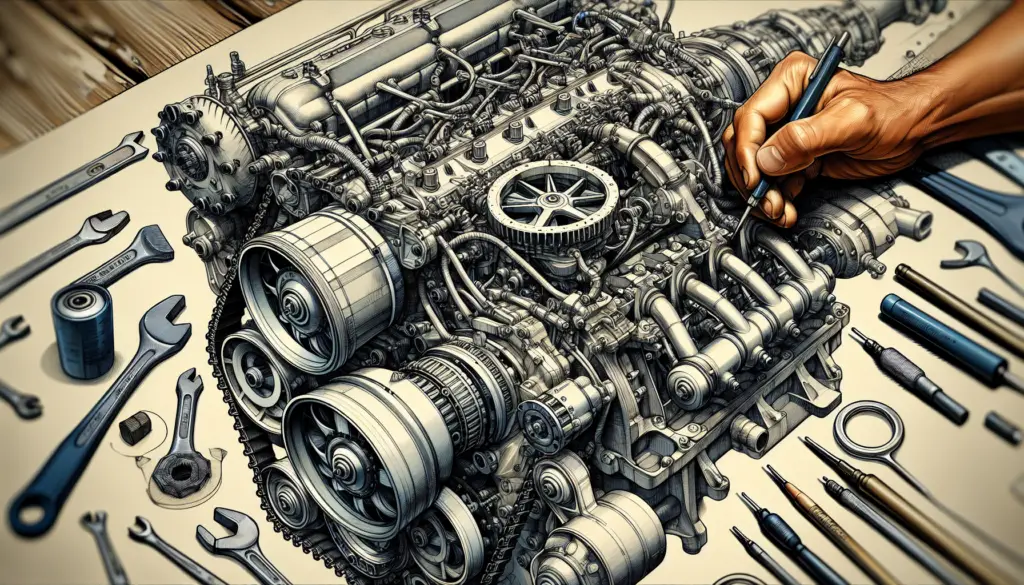
Troubleshooting Common Boat Engine Problems
Even with the right maintenance and use, boat engine problems can still occur. Understanding common issues can help you solve them quickly and efficiently.
Engine Does Not Start
If your engine refuses to start, it could be due to several reasons, including a dead battery, low fuel, or a faulty starter. It’s crucial to diagnose the problem correctly and handle it appropriately, whether that means recharging the battery, refilling the tank, or getting professional help.
Imbalance of Power
An imbalanced power distribution can result in slow cruising speeds, reduced fuel efficiency, and other problems. This can often be traced back to issues with the propeller, such as damage or improper setup.
Engine Overheating
Engine overheating can be dangerous and can permanently damage your engine. Most often, an overheating engine is due to a malfunction in the cooling system.
Unusual Noises
Any unusual noise coming from your engine is a sign that something isn’t right. It could be anything from a sign of an under-lubricated part to a more significant mechanical issue.
Decoding Boat Engine Specifications
If you’re planning to buy a boat engine, it’s essential to understand what all its specifications mean.
Understanding Boat Engine Jargon
From horsepower (HP) to displacement and revolutions per minute (RPM), boat engine jargon can seem intimidating. Take the time to familiarize yourself with these terms and what they represent.
Deciphering Engine Capacity
Engine capacity, often measured in liters or cubic inches, gives an idea of the engine’s size and, often, the power the engine can generate. A higher capacity usually equates to a more powerful engine.
Interpreting HorsePower Ratings
The horsepower rating tells you the power output of the engine. As mentioned above, the right horsepower for your boat depends on the size of the vessel and your intended use.
Identifying Fuel Types
Not all boat engines use the same type of fuel. Ensure you choose an engine whose fuel type is readily available in your area.
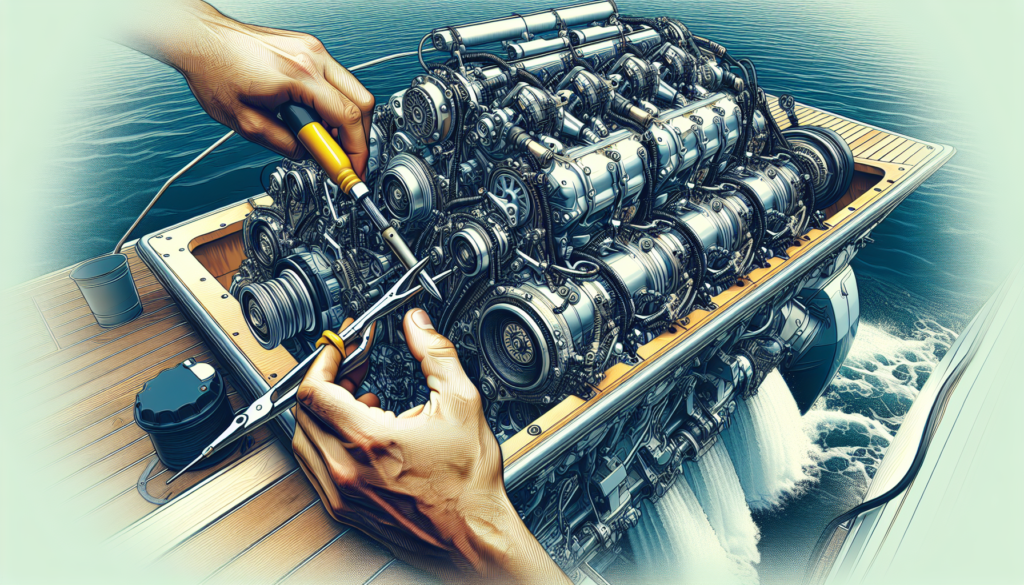
Using Boat Engines in Saltwater Vs Freshwater
The type of water you’ll be using your boat in can influence your engine choice, as well as your engine care practices.
Effects of Saltwater on Boat Engines
Saltwater can be very corrosive, causing rust and other forms of damage to your boat’s engine. This is why boats used in saltwater require extra care and maintenance.
Saltwater Maintenance Tips
Keeping the engine well-rinsed to mitigate the effects of saltwater is integral. Using freshwater to flush the engine after each use can greatly help to reduce the corrosive effect of the saltwater.
Effects of Freshwater on Boat Engines
Freshwater is less corrosive than saltwater but can contain other contaminants, like algae and silt, that could clog up parts of your engine.
Freshwater Maintenance Tips
Despite being less corrosive, freshwater engines still need regular flushing and cleaning to remove potential contaminants and prevent buildup.
Advancements in Boat Engine Technology
In recent years, there have been significant advancements in boat engine technology, aiming to make them more reliable, efficient, and eco-friendly.
Eco-friendlier Engines
Environmental sustainability is an ever-growing concern in every industry, including boating. Technologies such as cleaner emissions, alternative fuels, and electric propulsion systems signify a move towards greener boating.
Smart Engines
With the advent of digital technology, smart engines have become more prevalent. These engines include devices and systems that automate various engine functions and processes, providing enhanced control and convenience to owners.
Noise Reduction Technology
Engine noise can be a nuisance, especially on pleasure cruises. That’s why many engines now incorporate noise reduction technology to provide a quieter, more enjoyable boating experience.
Fuel Efficiency Improvements
Improved fuel efficiency is a critical trend in boat engine technology. This not only helps to reduce costs but also contributes to eco-friendliness by decreasing carbon emissions.
Cost of Owning a Boat Engine
The cost of owning a boat engine extends beyond the initial purchasing price.
Initial Buying Cost
This will depend on the type of engine, its size, power output, and brand. Generally, inboard engines are the most expensive, followed by sterndrive, outboard, and jet engines.
Maintenance Expenses
These include the cost of regular service, cleaning products, replacement parts, and professional services, if needed.
Fuel Consumption Cost
The cost of fuel can add up significantly, especially for larger, less efficient engines. It’s worth considering the type and cost of fuel an engine requires before buying.
Cost of Replacement Parts
Occasionally, some parts of the engine may need replacement. It’s good to keep in mind that replacement costs can vary from one engine type to another.
Selling and Buying Used Boat Engines
Whether you’re looking to upgrade your engine or make a bit of money off of your old one, the used boat engine market is worth considering.
Evaluating Used Boat Engines
Checking the engine thoroughly, including its operating hours, maintenance history, and current condition can help you make the right decision when evaluating used boat engines.
Determining the Right Price
Determining the right price while selling or buying a used engine can be tricky. Consider factors like age, condition, make and model, and market demand.
Where to Buy/Sell Used Boat Engines
Some options to buy/book used boat engines include dedicated boating websites, boating forums, or local boating dealerships.
Used Engine Warranties
Even used engines usually offer some warranty. Ensure you understand what the warranty covers to protect yourself from potential financial risks.
To sum it all up, boat engines significantly shape your boating experience. It’s important to take your time to understand the different options available and choose the one that best suits your needs and budget. Make sure you take proper care of your engine to ensure it remains efficient and reliable for as long as possible.

